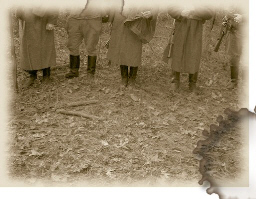
Personal statement:
There are a lot of questions that people ask me. Probably because I am a "real" Russian. Most of them are: how do you cook borsch or schi? what did you think about "Enemy at the Gates" or "Russians are coming"? (don't get me started on some of them...) how do you put on the footwraps? (go HERE for that) why do you do political officer impression, when you strongly dislike communists?
A political officer of my sort - Politruk or Komissar (not an NKVD officer) was acting often as a secular chaplain. The state religion was atheism-communism, so it is logical that a "chaplain" would be a political officer. A politruk was writing letters for the illiterate and wounded, reading letters from home and upholding unit's morale (not only by threats and propaganda). Politruk's impression on my part is not a political statement, it is an attempts to represent a controversial occupation, that by the way puts me in a postion to correct my fellow re-enactors when they mercilessly distort my native language:). Well, actually my unit is doing a pretty good job of learning the commands, at least.
Political officers were not always loved and not always hated. Their figures in history are very controversial, however. They were not always "chaplains". Before pereattestatsiya or reform of the political ranks in the RKKA in 1942 political officers had power to interfere with commanding officers and could make tactical decisions. The existence of two sets of commanding officers posed obvious problems. In 1942 their ranks were abolished and they returned to their political work. They participated in the life of troops, sometimes inspiring them to desperate attacks against outnumbering forces by personal example.
Here is the table of ranks before and after pereattestatsiya in 1942:
Category | Rank | Rank after 1942 |
Junior political personnel | Zampolitruk | Starshina |
Middle political personnel | Junior Politruk | Mladshiy/Junior Lieutenant |
Politruk | Lieutenant | |
Senior political personnel | Senior politruk | Starshiy /Senior Lieutenant |
Battalion Komissar | Kapitan/ Captain | |
Senior Battalion Komissar | Mayor / Major | |
Regimental Komissar | Podpolkovnik | |
Higher political personnel | Komissar of Division | Polkovnik/ Colonel |
Corps Komissar | General-Mayor | |
Army Komissar 1 class | General-lieutenant | |
Army Komisssar 2 class | General-colonel |
Photograph: Russian POWs 1941-1942



No comments:
Post a Comment